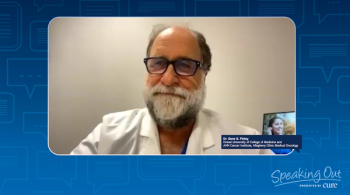
Treatment for muscle-invasive bladder cancer called dose-dense MVAC did not improve survival compared with chemotherapy alone, although one drug in the combination faces a shortage.

Treatment for muscle-invasive bladder cancer called dose-dense MVAC did not improve survival compared with chemotherapy alone, although one drug in the combination faces a shortage.

Some patients with metastatic bladder cancer and FGFR3 genetic alterations may benefit from Balversa, as it “represents a critical need,” an expert said.

It’s important to know what kinds of treatments are available for bladder cancer and understand that having a “tailored” treatment is important for patients, experts said.

Cancer survivors may face different mental and physical quality of life depending on their socioeconomic factors and age, according to a recent study.

An expert discusses the FDA’s investigation into the possible association between CAR-T cell therapy and secondary T-cell malignancies.

As part of its Speaking Out® video series, CURE® spoke Dr. Gene G. Finley of Drexel University of College of Medicine and AHN Cancer Institute, Allegheny Clinic Medical Oncology, about education disparities among patients with lung cancer.

As part of its Speaking Out® video series, CURE® spoke Dr. Gene G. Finley of Drexel University of College of Medicine and AHN Cancer Institute, Allegheny Clinic Medical Oncology, about advancements in treating non-small cell lung cancer and the unmet needs that persist for patients.

The recent approval of Fruzaqla (fruquintinib) for patients with pretreated metastatic colorectal cancer (mCRC) offers improved survival with manageable quality of life.

Lung cancer and pleural mesothelioma are often confused, so it’s important to understand the key differences between them, including tumor location and treatments.

Dr. Gene G. Finley spoke about current patient treatment obstacles as part of CURE’s ‘Speaking Out’ video series.

Dr. Gene G. Finley of Drexel University of College of Medicine and AHN Cancer Institute, Allegheny Clinic Medical Oncology, explains why the approval of Braftovi and Mektovi “It's an important improvement in our armamentarium.”

Hospice care can be a valuable resource for patients with late-stage cancer who want to improve the quality of the rest of their life.

The internet is flooded with information for cancer survivors, and it is vital they recognize the reliable sources from those that are not.

As a patient moves from treatment to survivorship, the fear of cancer recurrence may overshadow the ability for them to recognize how much they have endured, but support is available to hopefully lessen the burden.

Cancer survivors may often struggle with talking about their fear of recurrence with loved ones, which is why one expert recommends they seek solace in support groups.

Over the last 20 years, head and neck cancer treatment moved away from aggressive treatments for all patients to a more personalized approach — improving both outcomes and quality of life for patients with the disease.